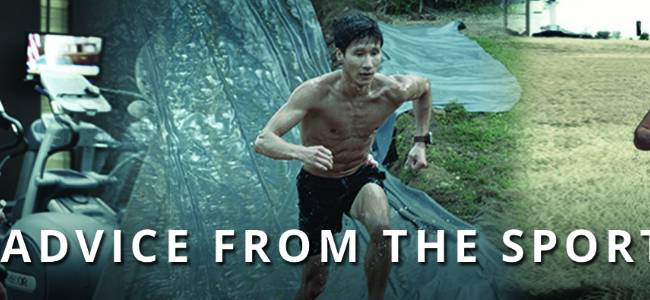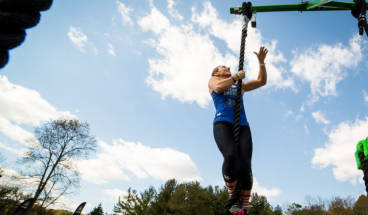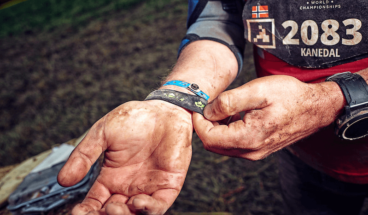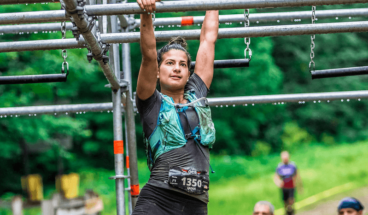
OBSTACLE COURSE RACING: How to Start Training
 Happy New Year! Almost a month of 2014 has already slipped by, but I hope you are on track and your actions are lining up with your intentions for a great year. Training plans, race schedules, juggling workouts and diets are par for the course for many of us these days. But for others, the question may simply be: I have the dream of completing my first obstacle race this year. So, where do I begin?
Happy New Year! Almost a month of 2014 has already slipped by, but I hope you are on track and your actions are lining up with your intentions for a great year. Training plans, race schedules, juggling workouts and diets are par for the course for many of us these days. But for others, the question may simply be: I have the dream of completing my first obstacle race this year. So, where do I begin?
My name is Juliana Sproles—I’m an obstacle racer, coach and personal trainer and this blog is not about me. I will, however, give just a little of my background to help get us started. At age 13, I began running (for fun). At age 19, I became an age-group triathlete. At age 40, I completed my first Ironman (in Kona). At age 42, I became the first female to win the obstacle race called World’s Toughest Mudder. At age 43, I joined the Spartan Race Pro Team.
And now at age 44, I am starting all over to train for my first obstacle race of 2014 and begin my third season in the sport. It’s a fitting time to step back and take a fresh look at how to approach this incredible sport. So let’s take a look at some of the strategies to get started in obstacle racing.
#1 DEVELOP BELIEF
Some people will say, “just get out there and do it” and that does work…for some. Others prefer a more methodical approach that deepens their belief and confidence bit by bit. When I encourage someone that he or she absolutely CAN complete an obstacle race, this is what I usually say: Think of it as a nice hike through the woods with friends, finding fun stuff to do along the way.
I’ve partnered with many in accomplishing the goal of a first race (in running, triathlons, including Ironman, and some of the greatest obstacle course races anywhere). I find nothing more rewarding than witnessing such completion and feats of endurance by first timers time and time again. The common denominator for these athletes (yes, I said ‘athlete’—there IS one in each of us) is remaining open to possibility. The more steps they take to prepare for their chosen race, the more enjoyable their experience is likely to be. And the more they intrinsically believe they can do it, the more positive the outcome for themselves and for those around them.
What do people believe in themselves sound like? “Yes, I’m racing an obstacle course on January 25th, 2014.” “I am hiking, walking, jogging and doing some strength training to prepare.” “Oh, and I’m doing Burpees!” “I cannot wait, I am so excited.” “I’m also scared to death.” “I have no idea what to expect, but I know I will find a way to finish.” “I can ask for help if I want to.” “All I have to do is take the next step.”
Granted, they may simply be trying to convince themselves, but eventually it sinks in and becomes a reality. Developing self-confidence is the first step to being a successful Obstacle Course Racer. How do you do that? By finding your mental edge…
#2 MIND YOUR MENTAL GAME
As with any goal or new endeavor, it takes time to adapt. In sports, the body must adapt and so must the mind. In order to be as successful as you can be at the sport of obstacle racing, it is a great idea to practice concentration, focus, attention and most importantly — quieting the voices that do not serve your greatest good. Listening to the “I can do it” voice is best, but not always easy. One of the hardest things to overcome is the voice that tries to tell you your effort isn’t good enough.
Let’s say you are just beginning a running routine, and it will be mixed with hiking and walking (which is a highly effective way to start (or continue) training for obstacle racing). One voice says: “You should be able to run up this hill, why are you so lame, weak, slow or tired?” Another voice says: “It is ok to walk a little, hike a little, jog a little, move into the road or off onto a trail— I can mix it up and not be concerned about my average pace or max speed—I have my whole entire life to do this if I want to, so what’s the rush?”
Taking that second option is okay. Giving ourselves permission to take steps in our own way and time is powerful. By doing that we can become highly attuned to our bodies, letting our ‘monkey mind’ move into a new space which has more to do with spirit and soul. The more you allow yourself these steps, the farther you’ll go and eventually, you will surprise yourself once you look back.
#3 PACE YOURSELF
I’ve witnessed many an obstacle racer become obsessed with training and racing—this sport is highly addictive. Everyone always seems to be doing more. It becomes competitive, and there is nothing wrong with that. I completed 38 Spartan Races, my second Ironman and several other swimming and running events over a period of 15 months before nearly taking myself out of the game. Sure, I proved I was durable (to a point). Sure, I proved I could race back-back-days (but how effectively?) But who cares? Nobody really.
Though we all love to see our friends at races and fly through course after course, I’m here to tell you that the way to keep progressing is to pace yourself. And I mean more than just during a race. I mean during training periods (rest days are imperative and so are weeks of higher volume interspersed with lower volume training weeks) and most importantly, during life itself. The best athletes out there find a training schedule that that fits their very own lifestyle. Be imaginative, inspired, spontaneous and creative, but be smart—particularly in the beginning. Being conservative is a skillset not many new athletes possess, but should.
#4 PRACTICE CONSISTENCY—SOMETHING IS BETTER THAN NOTHING
There is a learning curve with obstacle racing and every athlete takes to it a little differently. I fell into the sport and never really intended to try to go fast. The first season, I took on longer challenges and was still running at a decent clip, but not fast. In my second season I put on weight as I added strength training to my regimen and I became a bit slower. Going into my third season I hope to strike a nice balance between strength and speed. In fact, coming off the holiday season I am sitting at least 15 pounds over my ideal race weight, but I’m not ashamed to tell you this. I am also not ashamed to tell you I am returning to running after having taken most of the fall off. Humbly, I set out a few Sundays ago for my real run since last August or September (World’s Toughest Mudder 2013 notwithstanding). I ran 3.7 miles (and was instantly elated to be out there), before stopping to cool down and stretch. I vow to continue such practice, as I believe it will be good to see how my body adapts to getting back into shape.
As a veteran athlete, I’ve learned that frequency for me is more beneficial than duration. That means that if I can get out and run (or even hike or power walk) four days a week for 30 or 45 minutes or even an hour, that will help my body adapt quicker than completing one 90-minute or 2-hour run in a week. Even if we tell ourselves we don’t have the time to be able to workout than many days each week, find those “somethings” that you can do to stay active (without overdoing it of course).
The point of all this? It’s simple. To be a good athlete, you will need to be consistent and that means being opportunistic with your training while finding the right balance for things outside of racing.
***
While there isn’t a formula that applies to every athlete out there, getting your mind, body and spirit in shape simultaneously will serve you well no matter if this is your first or fifth season of obstacle racing. Follow these tips, along with some more to follow in the coming weeks, and before you know you’ll find yourself a faster, stronger, and happier athlete alongside the rest of us.
Good luck and see you out there!


